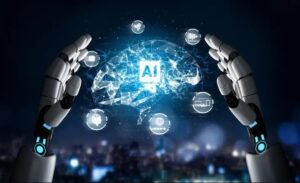Revolutionizing Marketing with AI: Strategies, Trends, and Insights
In today’s fast-paced digital landscape, marketing has undergone a profound transformation. Artificial Intelligence (AI) is at the forefront of this revolution, empowering marketers with advanced tools and strategies to reach and engage their audiences in unprecedented ways. In this comprehensive guide, we’ll delve into the realm of AI in marketing, exploring its strategies, emerging trends, and invaluable insights.
Understanding AI in Marketing: The Foundation
AI in marketing is the application of artificial intelligence technologies to analyze data, automate tasks, and make data-driven decisions. The core principles of AI in marketing are pivotal to successful implementation:
- Data Analysis: AI algorithms can swiftly analyze vast amounts of data, extracting valuable insights to drive marketing strategies.
- Personalization: AI allows for hyper-personalized marketing, tailoring content and offers to individual preferences.
- Chatbots and Virtual Assistants: AI-powered chatbots and virtual assistants provide round-the-clock customer support and engagement.
- Predictive Analytics: AI can forecast consumer behavior and trends, enabling proactive marketing strategies.
Evolving with AI Marketing Trends: What’s Current
The AI in marketing landscape is ever-evolving, and staying abreast of the latest trends is crucial:
- Chatbot and Voice Search: AI-powered chatbots and voice-activated search are increasingly common for enhancing user experiences.
- Predictive Customer Analytics: AI-driven analytics offer insights into customer behavior and predict future actions.
- AI-Generated Content: AI is used to create engaging content, from articles to product descriptions.
- Programmatic Advertising: Automated ad buying using AI ensures efficient targeting and ad placement.
Mastering AI Marketing Techniques: Tools and Skills
Marketers harness a range of AI tools and techniques to create compelling campaigns. Here are some essential components of an AI marketing professional’s toolkit:
- Marketing Automation Platforms: Tools like HubSpot, Marketo, and Pardot automate repetitive tasks and facilitate personalized marketing.
- Natural Language Processing (NLP): Understanding and leveraging NLP for chatbots, content analysis, and sentiment analysis.
- Machine Learning Algorithms: Building and training models for predictive analytics and personalization.
- AI-Driven Content Creation: Using AI platforms to generate high-quality content, graphics, and videos.
Practical Tips for Artificial Intelligence Marketing Success
To excel in the world of AI marketing, consider these practical tips:
- Data Quality: AI relies on quality data. Ensure data accuracy and cleanliness for robust insights.
- Human Oversight: While AI is powerful, it’s essential to retain human oversight for creative and strategic input.
- Customer Privacy: Respect data privacy and comply with regulations to build trust with your audience.
- Continuous Learning: AI is evolving rapidly. Stay updated and keep learning to maximize its potential.
Inspiration from Real-World AI Marketing Projects
We’ll explore real-world case studies of AI marketing projects, showcasing how AI technology has improved targeting, customer engagement, and marketing ROI.
Conclusion: Your Journey in AI Marketing
AI is not just a tool; it’s a transformative force in the marketing world. Understanding the foundational principles, staying updated with trends, and mastering essential techniques are the keys to success. Whether you’re implementing chatbots, predictive analytics, or AI-generated content, AI marketing empowers you to deliver highly personalized, data-driven campaigns.
As you embark on your journey in AI marketing, remember that creativity, data-driven decisions, and ethical practices are your guiding principles. AI in marketing is an exciting realm where innovation meets strategy, and it holds the potential to create more meaningful connections between businesses and their audiences.
